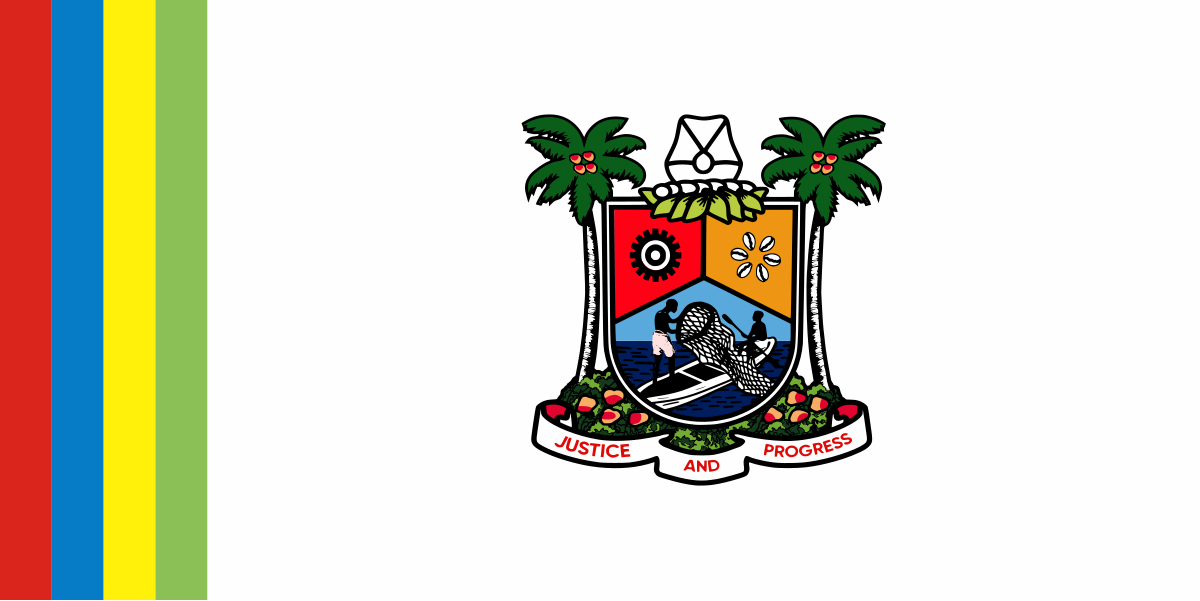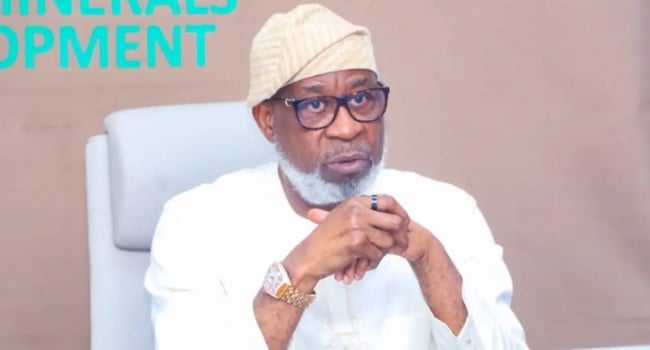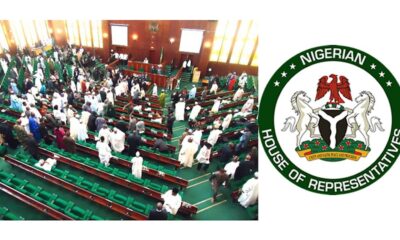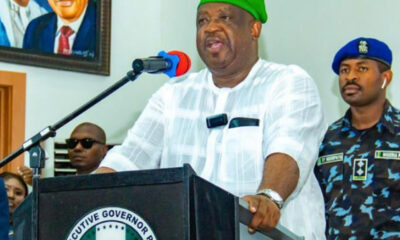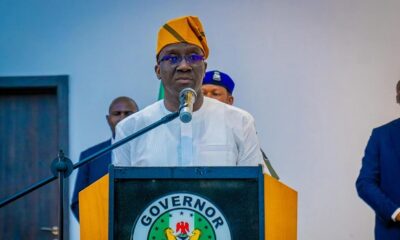The controversy surrounding Senator Natasha Akpoti-Uduaghan’s suspension took a fresh twist on Tuesday as the Peoples Democratic Party and several Senior Advocates of Nigeria condemned the Senate’s decision to bar Akpoti-Uduaghan from resuming when the upper chamber reconvenes on September 23.
In a letter dated September 4, the Acting Clerk to the National Assembly, Dr Yahaya Danzaria, formally notified Akpoti-Uduaghan that her six-month suspension imposed on March 6 remains in force until the Court of Appeal delivers judgment in her suit against the Senate.
“The matter remains sub judice, and until the judicial process is concluded, no administrative action can be taken to facilitate your resumption. You will be duly notified of the Senate decision on the matter as soon as it is resolved,” the letter stated.
The communication dashed hopes of the Kogi Central lawmaker, who, according to her lawyer, Victor Giwa, had already begun preparations to rejoin her colleagues after serving out the six-month penalty.
Akpoti-Uduaghan was suspended on March 6 after the Senate adopted the report of its Committee on Ethics, Privileges and Public Petitions, which accused her of insubordination for refusing to vacate her assigned seat during plenary.
The decision stripped her of salaries, aides and office privileges.
The senator has consistently maintained that her suspension was politically motivated, linking it to a petition she filed accusing Senate President Godswill Akpabio of sexual harassment—an allegation the Senate dismissed. She challenged the action in court, announcing in April that she had secured judgment in her favour. However, Senate leadership insisted she would remain suspended for the full six months.
In July, her dramatic attempt to force her way back into the chamber ended in a standoff, as security operatives barred her entry despite protests by her supporters outside the National Assembly.
Reacting to the fresh letter, the PDP accused the Senate leadership of acting in bad faith.
In a statement by its National Publicity Secretary, Debo Ologunagba, the party described the action as a calculated attempt by the APC-led Senate to stifle opposition voices and deprive the people of Kogi Central of representation.
“The attempt to use the National Assembly establishment against an elected senator of the Federal Republic of Nigeria in gross violation of the Constitution and the Standing Rules of the Senate is highly provocative and constitutes a clear and present danger to democracy,” the statement read.
The party alleged that the renewed move was part of a wider “creeping totalitarianism” under the APC-led Federal Government and demanded that the Clerk of the National Assembly withdraw the letter immediately.
PDP also linked the development to what it described as Akpabio’s “history of harassment against women,” urging the Senate President to clear himself of allegations rather than “intimidating” a female colleague.
The opposition party further called on the international community, rights groups, and democratic institutions to intervene, insisting that Akpoti-Uduaghan must be allowed to resume.
Senior Advocates of Nigeria said the Senate was overreaching in stopping Akpoti-Uduaghan from resuming at the upper chamber after serving her six-month suspension.
They argued that the argument of awaiting the determination of the court case before allowing Akpoti-Uduaghan to resume was constitutionally wrong and unjustifiable.
On his part, Adedayo Adedeji (SAN) argued that it was prudent and constitutionally proper for Senator Akpoti-Uduaghan to be allowed to resume her seat as her suspension period had elapsed.
This, Adedeji said, would preserve the Senate’s dignity, show respect for its disciplinary powers, and ensure that the people of Kogi Central are not left without representation in violation of Sections 68 and 1(3) of the Constitution.
He argued that the suspension of Akpoti-Uduaghan raises a constitutional issue beyond internal discipline.
Adedeji said, “While Section 60 of the 1999 Constitution (as amended) empowers the Senate to regulate its own procedure, Section 68 makes clear that a member can only vacate a seat in circumstances expressly provided by the Constitution. A temporary suspension must, therefore, not be used in a way that effectively denies constituents their right to representation.
“In Senator Natasha Akpoti-Uduaghan v. Clerk of the National Assembly & Ors (FHC/ABJ/CS/384/2025), Hon. Justice Binta Nyako, though declining jurisdiction on separation of powers, cautioned against excessive suspensions, noting that a six-month suspension, half a legislative year, undermines constitutional representation. Her Lordship observed as follows:
“I do not think this is the intention of the framer of the law. To make a law that has no end is excessive and cannot be the intention of the law… The Senate has the power to… recall the plaintiff and at the same time allow her to represent the people who sent her there.”
Another SAN, Wale Balogun, also spoke in favour of Senator Akpoti-Uduaghan’s return to the Senate, having served out her six-month suspension.
Notwithstanding the pending case, Balogun argued that the Senate should respect constitutional democracy and not further deprive Natasha’s constituency of representation.
Balogun said, “I feel that the Senate should be magnanimous in the interest of a constitutional democracy. It’s not only about Senator Natasha. They should remember it’s about the good people of Kogi Central senatorial district, and it’s about the constitutional democracy that we practice.
“So, candidly, I do not share the sentiment of the Senate with respect to that position. Now, we are talking of two different scenarios. The first scenario is a suspension by the Senate, which I want to discuss with you.
“So, it’s a suspension from the Senate, that’s the first primary issue, which is for a defined period of time, for six months. The second issue is the fact that suspension is now a subject matter of litigation that is ongoing. So, these are two separate things. Now, she has, by exclusion of time, which is the six months as prescribed, whether rightly or wrongly, the subject matter of which is pending in court. So, by exclusion of that time, the woman has now spent six months, and now the six months are over. So, naturally, that brings an end to those six months, because in other words, she has served the suspension.”
Referring to the instance of Bode George, Balogun wondered if Natasha would remain on perpetual suspension even though the court case may drag on for months, even years.
“The issue that is in court is a separate case. It’s a secondary issue arising from this primary issue. So, the court can still uphold her suit to say, No, you didn’t suspend her rightly. You know, they took away all her allowances, salary and others. The decision of the court will now give life to it.
“So, since the suspension has ended, she is supposed to be able to go back to the Senate, but the lawfulness or otherwise is still a subject matter that will continue in court. Even though she has spent the time, just like the prisoner who has spent his time. But whether he’s been wrongfully convicted, now, just like this senator, whether she was wrongfully suspended, will continue. The court will now pronounce one way,” Balogun said.
In the same vein, Paul Obi (SAN) described keeping Akpoti-Uduaghan outside the Senate chambers, after serving her six-month suspension, as wrong, unjustifiable, overreaching and an overkill.
“I don’t think that will be an action that is justifiable under the law, because you have put the woman on suspension for six months. She has tried to get the courts to reverse that. She has tried to get public opinion, sympathies and national communities to reverse that.
“You have stopped your guns and insisted on six months. Six months are drawing near now. And you want to start using the courts to extend, or judicial process, to extend that six months.
“That would be ultra vires in the powers of the Senate. I don’t think they will have that constitutional power to do that, and I think that would be overreaching and an overkill. The woman has served her punishment for what she did, by your own rules and by your own prescriptions. Allow her to return to the Senate to do her job for her constituency. They have no justification for that attempted extension of her suspension, because that’s what it is. They want to extend the suspension surreptitiously. That’s not right.”
Similarly, Ebun-Olu Adegboruwa (SAN) said the Senate was overreaching itself in not allowing Akpoti-Uduaghan to resume in the Senate until the case is determined by the court.
Adegboruwa argued that an indirect extension beyond the six-month suspension portrays the Senate as being vindictive and petty.
Adegboruwa said, “I think the Senate is overreaching itself with this position. First, the suspension of the Senator was for six months, which was limited by time. Once the six months expire, she should be allowed to resume her seat in the Senate automatically. Failure to allow her to resume is indirectly extending the suspension beyond six months, without a valid resolution of the Senate to that effect. There is no such resolution at the moment. The case pending in court cannot be the reason to extend her suspension illegally.
“Second, the court case being referred to relates to the six-month suspension, as to its validity and constitutionality. The appeal flowing from that case is also limited in scope to the six-month suspension. Anything to the contrary will portray the Senate as being vindictive and petty.
“Third, the point was made by the trial court that the period of suspension should not exceed the usual sitting days of the Senate for a session. To refuse her resumption after the six months will be to make the suspension indefinite.”
He argued that the purpose of the suspension has been fulfilled, hence depriving Natasha of resumption was depriving millions of constituents of representation.
“Since this matter relates to the rights and privileges of a whole constituency comprising millions of voters, the Senate should do the needful by allowing Senator Natasha to resume forthwith.
“She has already served the six months in full, and any determination by the court can only relate to the validity of the suspension and her entitlements, but certainly, the sessions of the Senate that she missed due to her suspension cannot be reversed forever. In essence, the purpose of the suspension having been fulfilled, no useful purpose will be served to deny her from resuming duties as a Senator,” Adegboruwa said.
Taking a contrary position, Chief Mike Ozekhome (SAN) argued that the Senate and Akpoti-Uduaghan should continue to fight to see out the case.
“On Natasha, the last time I checked, I thought I saw both parties in court with appeals and cross appeals. This means that both parties should fight their appeals and await the court’s pronouncement.”
Also, Socio-Economic Rights and Accountability Project, in a statement on Tuesday, condemned the Senate’s stance on Natasha’s resumption.
The group said, “The Senate President Mr Godswill Akpabio and Nigeria’s Senate must immediately allow Senator Natasha Akpoti-Uduaghan to resume her legislative duties as indicated in her letter to the clerk of the National Assembly.
“The Senate cannot use the pending case(s) in court as a pretext to prevent Mrs Natasha Akpoti-Uduaghan from resuming legislative duties. This is antithetical to the fundamental notion of the rule of law.
“There is no law in Nigeria that prevents the resumption of her legislative duties pending the hearing and determination of the case(s) in court. This travesty of justice must end.”
The group added, “Mr Godswill Akpabio and the Senate must immediately honour Mrs Akpoti-Uduaghan’s letter notifying the clerk to the national assembly of her intention to resume on September 4, the date she said marked the end of her six-month suspension.
“The Senate should not continue to punish Mrs Natasha Akpoti-Uduaghan solely for the peaceful exercise of her constitutionally and internationally recognized right to freedom of expression.
“The Senate must allow her to resume her legislative duties and pay her salary and allowances for the duration of the suspension.”
SERAP held that preventing her to resume her legislative duties is a blatant disregard of the provisions of the Nigerian Constitution 1999 [as amended] and the country’s international human rights obligations including under the African Charter on Human and Peoples’ Rights and the International Covenant on Civil and Political Rights to which Nigeria is a state party.
“No one should ever be punished for ‘speaking without permission’. Being a senator does not deprive Mrs Akpoti-Uduaghan of her fundamental human rights.
“The Senate should be setting an example by upholding the rule of law and promoting and protecting fundamental human rights, not stamping them out.
“A higher degree of tolerance is expected when it is a political speech and an even higher threshold is required when it is directed towards government officials including members of the Senate.”
FOLLOW US ON:
FACEBOOK
TWITTER
PINTEREST
TIKTOK
YOUTUBE
LINKEDIN
TUMBLR
INSTAGRAM



